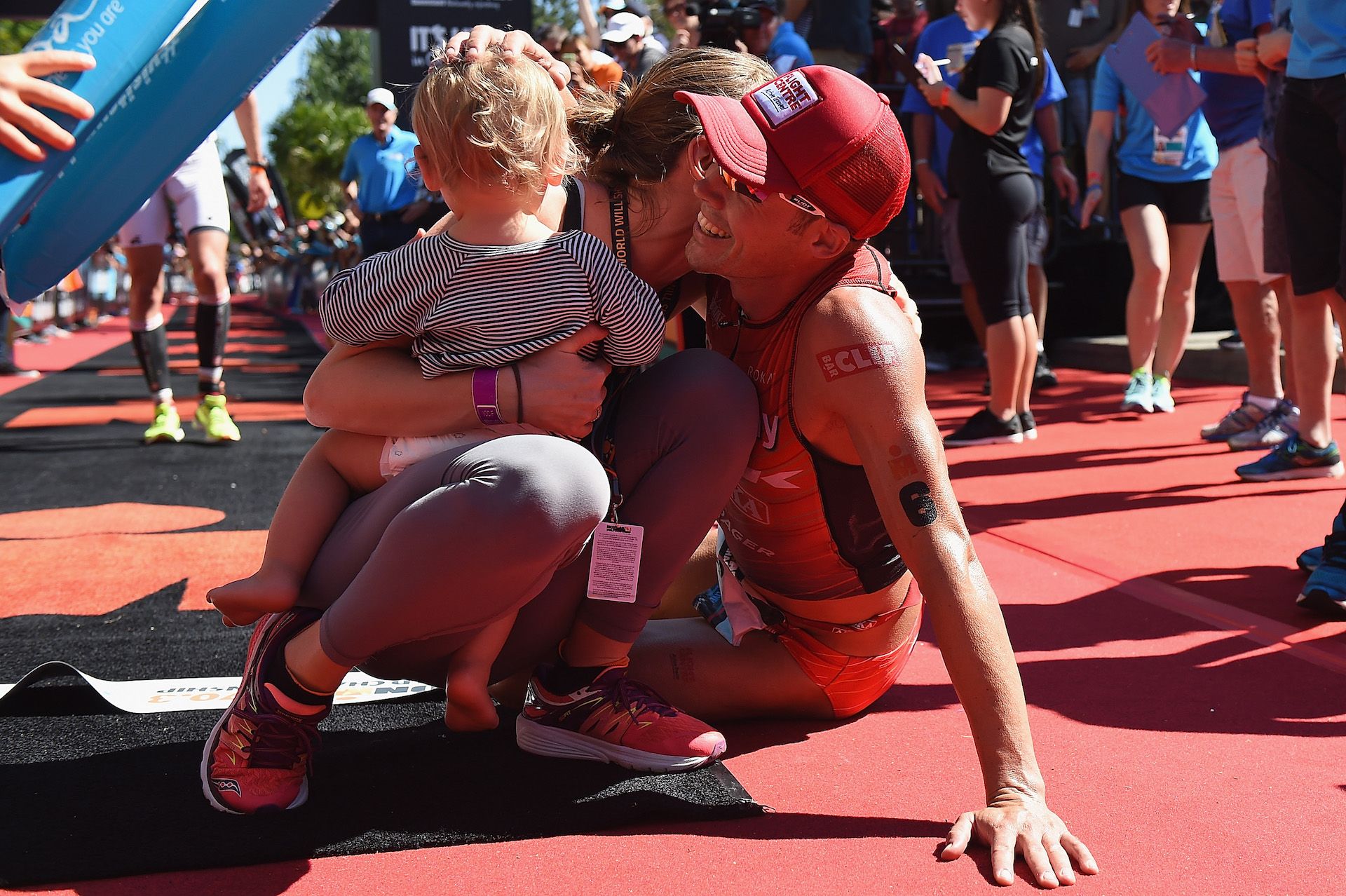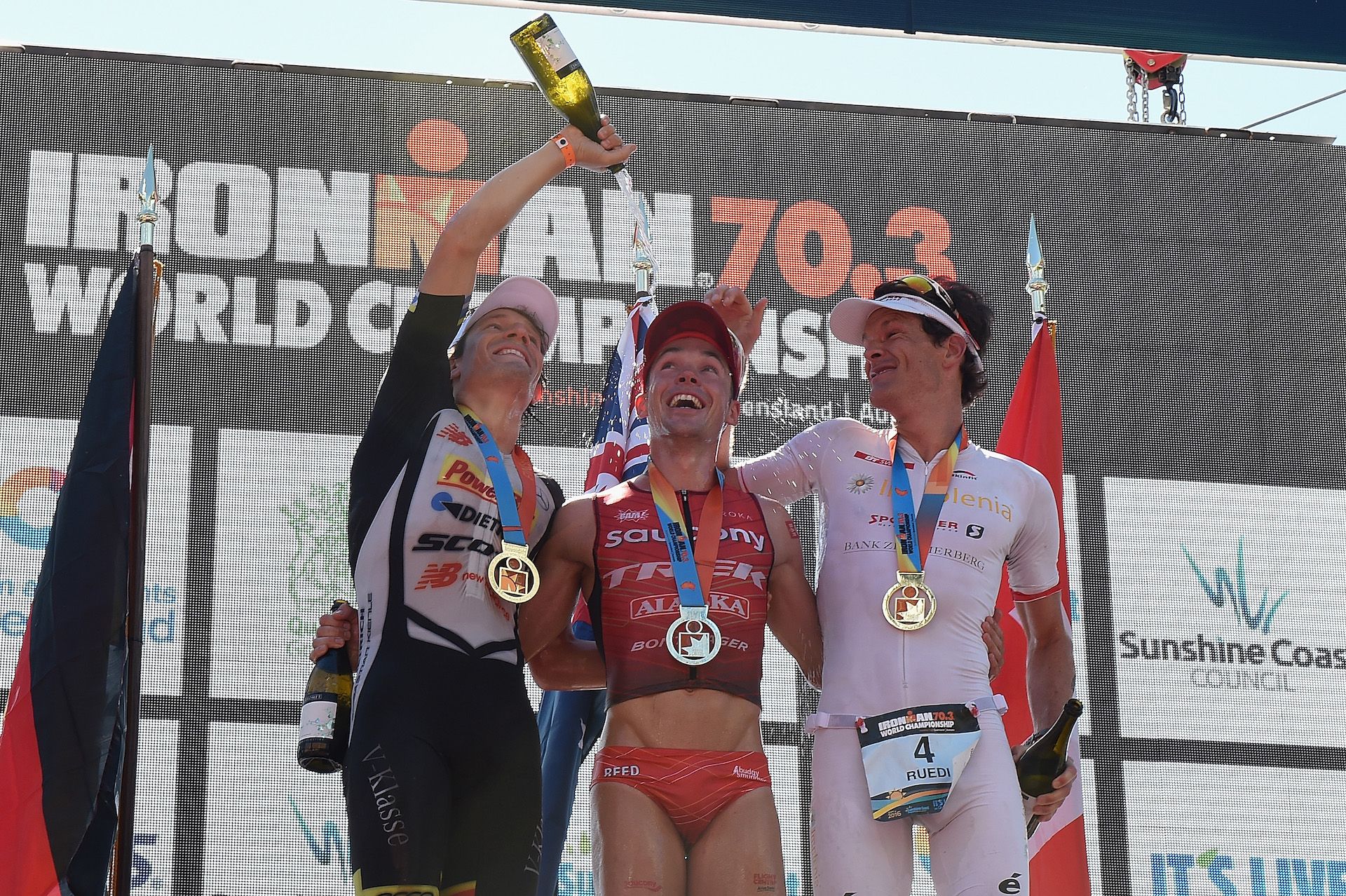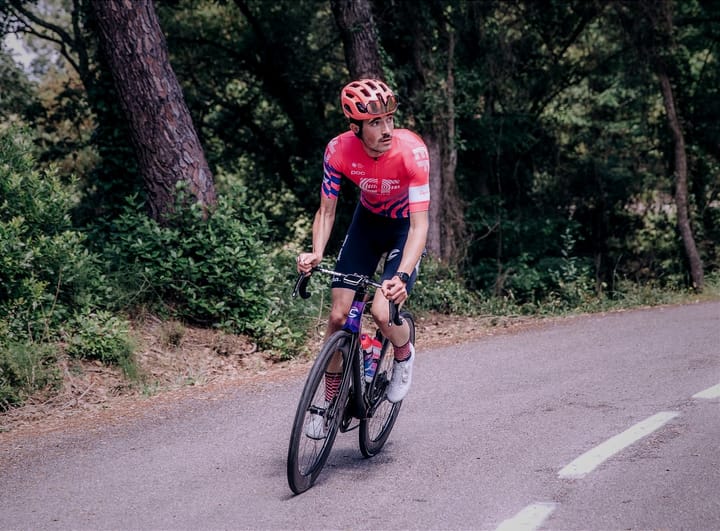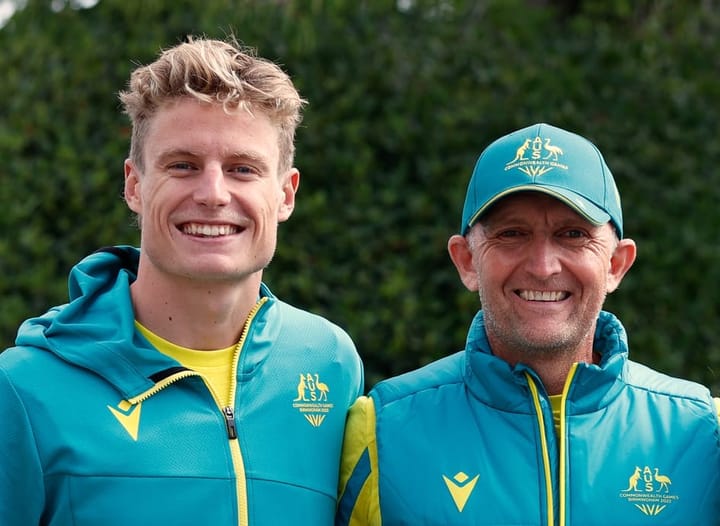Tim Reed: World Champion, Great Dad, Good Bloke
In an in-depth interview, Tim Reed discusses his unique preparation, race tactics, and the role of his family in securing his third major title of 2016, including the World 70.3 Championship.

Aussie triathlete, Tim Reed, recently added a third championship title to his haul for 2016. In this interview, Jeremy Thewlis talks to Reed about his preparation, how the race panned out, his plans for the future and how his wife and kids helped him to become a champion.
He’s just brought home the World 70.3 Championship title after a cracker of a race in Mooloolaba, making it three major titles he’s won this year. Sebastian Kienle recently called him ‘the big red kangaroo’. His mates describe him as a master race tactician and an obsessive tweaker of gear and training programs. In this interview, Trizone goes in-depth with Aussie triathlete, Tim Reed, who talks about:
- his unusual preparation for Mooloolaba
- dealing with anxiety
- coaches
- why two seconds is more than enough time to win a race
- and how to be a world champion and a good bloke at the same time.
Trizone: Congratulations on a fantastic result at the 70.3 World Championships, Tim. That was a nail-biter of a finish! But before we get to the race itself, can you describe your pre-race preparation? I gather it wasn’t a typical build-up to the race this time around?
TR: I was definitely more relaxed this year. If you’d said to me last year that I was going to win a world title I would have fully believed you, because I’d done perfect preparation. I’d sacrificed so much, and so had my wife, to give me the absolute best circumstances to train leading up to that race. This year it was almost the complete opposite. I’d been getting sick regularly, I’d had some issues with getting wisdom teeth out, all sorts of things, so I thought, ‘Well, it is what it is!’ I just didn’t feel the same pressure. I knew I could still do really well, but I didn’t feel like I’d put everything on hold for it and made the family really pay the price for it like I did the year before. So I was relaxed.
I normally get very anxious before races and often struggle to sleep well… sometimes three to four days before a world championship. This time around I didn’t get any real nerves until the night before, which is good going for me. As soon as I got into the swim warm-up I could tell that things were good. The same feeling happened the moment I got on the bike – I knew the legs were there. And I got excited in the race about winning – I thought this is a day where everything’s on and anything could happen and I’m right where I need to be. So that was my pre-race. It was certainly an imperfect build but a relaxed pre-race and that’s always when I’ve had my best races – when I’m chilled out and having fun. So, somehow I’ve got to try and keep that relaxed vibe going into all my big races from now on.
Trizone: When you say you don’t sleep pre-race, what’s going through your head?
TR: You need to understand that we all work so hard for these races. Sometimes you might have contracts coming up with sponsorship deals and you know that a great race at World Champs can lock down a great salary with sponsors for the next two years or it could mean that you’re back out looking for part-time work. It’s not typical for me to be that anxious before most races It’s only really World Champs where it seems to really get to me. But instead of focusing on the opportunity to succeed, I end up overly focused on how easily I could fail. That’s not the frame of mind that you should be in!
Trizone: You mentioned meditation in your post-race interview – is that something new for you or has that been an ongoing strategy?
TR: My wife and her mum have actually been pushing me to do it for a long time. They know I’m a pretty intense guy! I just put on some calming music and do some deep breathing. Sometimes it’s only 15 or 20 minutes and then I go out and do my final session for the day. It’s just enough to begin to unwind and it seems to really help me. I don’t think I missed a day for three weeks going into the race. We’re only just starting to understand how important the brain is to high performance in sport. I’ll take any advantage I can get – if I can get my brain on side then I’m all for it!
The Race
Trizone: Can you talk us through Sunday’s race?
TR: I came out of the swim where I needed to be and then on the bike I made sure I was well-placed for the onslaught of what I thought would be first Sebastian Kienle and then later Lionel Sanders coming through. The pace was hard, but it was never insane like I expected and I felt quite strong and was able to have a dig myself at later points in the bike. I thought from the front few guys that the racing was really fair. And I was relieved that Sanders never caught up, but I was thinking that after a tough bike leg he’d still be the one to beat on the run.
I got onto the run and there was an issue with my GPS tracker. I had it on me but the Ironman crew thought I didn’t, so they gave me another one. So I was fiddling around and lost a bit of time there. That put me on the back foot coming out of transition so I had some work to do to get back to Sebastian and past the four or five other guys who were between us. I tried not to panic and just slowly moved my way up past Andy Dreitz and Sam Appleton and eventually caught onto Kienle maybe four or five km in.
Sebastian suggested we work together and make this a race for first and second. I was all for that and any advantage I could gain from working with Sebie I was going to take. So we did that up until 10 or 11 km, just swapping turns and protecting each other from the strong headwind. It certainly benefited us both. At that stage I could tell the cooperation was starting to end because Sebastian started putting in some huge surges.
It’s funny what you learn from past races. In Vineman 70.3 a couple of months ago, I was the one putting in all the surges because I was feeling great. Gradually guys were dropping off, but I remember Andy Potts just kept slowly working back to me each time rather than panicking. And when we got to 18 or 19 km on the run he put in one big move and I was completely gone. I learnt from that experience and tried not to panic every time Sebastian went. I slowly worked my way back to him, rather than surging back to his shoulder.
There was a point there where I thought the rubber band had broken. At 13 or 14 km he led by 20-30m, maybe more. It’s quite a gap when you’re completely wrecked. I thought Sebastian, being the IM World Champion that he is, he’s going to hold on here. I was quite happy with finishing second but only if I knew that I’d given absolutely everything. And so I just kept running just as fast as I could. With maybe a kilometre to go, Sebie was flying and I caught back up to him and I was quietly cheering that the win was back on the cards.
I thought if he’s going to go, he’s going to go on the uphill. He’s the strong man here and he tried to push it but I felt really comfortable. Then I tried to go around him, but he cut me off so I couldn’t cross the centre line. I thought I’m going to have to go around the long way, but at least he’s panicking. Then as soon as we got close to the crest I just went for it, established a 10m gap and then just held on from there.
Digging deep and two second victories
Trizone: It was edge-of-the-seat stuff! Tell us, when you’re at the very limits of your energy and ability, how do you find the mental and physical capacity to dig deeper?
TR: I think it’s when I realise the result is not what’s important. For me, I just want to get to the finish and know that I have absolutely given everything. When I let that go, I just relax. I feel like my run just loosens up and then it is what it is. You’re just trying to keep good form and run as well as you can, rather than letting too much mental stress take over the battle. It’s quieting the mind and letting things flow. And if it ends being a second place and you’ve run your best, then so be it, but if you end up finishing first and you haven’t given everything then I think that’s a bit disappointing.
Trizone: So it’s more about relaxing…
TR: And accepting… You can’t control some things. I can’t control if Sebastian’s faster than me, but I can control my level of effort.
Trizone: The reality is there’s often not a lot physically between the top athletes at this level of competition. It really does get down to what’s going on in their brain on the day.
TR: Absolutely. And this might sound ridiculous but I’d visualised coming up to a sprint finish with Sebastian in the race and I’d visualised several athletes in that situation. I just ran through some of the main guys I thought I might be running with. I pictured when I would attack and it pretty much played out exactly the way I had visualised. There’s something to be said for it.
Trizone: Speaking of the sprint finish, just over a year ago, you and Tim Berkel were sprinting up the chute at Cebu and you beat him by two seconds. This year you were sprinting up the chute at Mooloolaba with Sebastian Kienle and you beat him by two seconds. What’s with the tight finishes? Are you leaving things a little late?
TR: (laughs) Yeah, I’ve just got a good record with sprints. I’m happy to hang in there and wait and wait and wait until the last moment because so far it’s worked out for me every time. I think I’m actually most susceptible between 15 – 17 km and then once I get a sniff of that finish line I’m happy to hang in there and know that that leg speed will get me across right at the end. So, it’s not that I like a tight finish, I’ll use whatever tactic that will win me the race!
Coaches and family support
Trizone: Let’s talk coaches. You were working with Dan Plews and and now you’ve been with Matt Dixon for the last year. What are the differences?
TR: They are very different. As far as personality goes, I really like both guys. But, in terms of their style of coaching, Dan is incredibly focused on the details and the science of the sport. And that was sort of my game as well. So when we got together we were bringing the same strength to the table and it became almost an overload of focusing on every little detail. Matt is more into the psychology of racing. He’s more relaxed about the details and more focused on getting the basics right. We work really well together because he stops me overthinking and over-analysing it. We just try and nail what’s most important.
With my personality I still end up doing a lot of the little things, but it doesn’t become the focus. I feel with Matt that I just enjoy the sport more – I’m just less stressed out by it all. Before the World Championships his emails were about just going out and having fun, because he’s knows that I’m anxious enough already! I don’t need to get more motivated, I need to chill out. In training it’s the same. If I skip a session, he understands I’ve got a family. Some nights we don’t get much sleep… and I know Matt’s not going to be looking at the training logs and be furious that I skipped a session. He just sort of gets it. I enjoy working with Matt.
Trizone: Speaking of family, you’ve obviously got a great support structure around you.
TR: It’s funny, because after I thanked Monica in my speech after the World Championship she said I shouldn’t keep thanking her – it sounds like she’s doing everything for me! During the pressure times and the more intense training phases she steps up in a huge way. I guess the hardest part for Monica is I’m away a lot. She’s a working mum, so she’s looking after the kids on her own. But it’s not only that. Crowie (Craig Alexander) mentioned this the other night at a barbecue – there are so many times when you’re there, but you’re not really there, you’re just so exhausted. So there’s a lot of understanding that comes from Monica in that regard and certainly when I do have a break I try and make up for it where I can. But there’s no way I can really make up for everything she does, that’s for sure.
Trizone: Family life is a crucial part of success…
TR: I can’t pretend that my marriage has been perfect – we’ve had some tough times and it certainly gets put under stress. When things aren’t great at home, everything suffers. You start hating training, you don’t enjoy the racing, you know things just aren’t quite the way they should be. But when everything’s humming along nicely on the home front, I just find everything – the training and the racing- is more enjoyable as well. So, I think they go hand in hand. If family life is going well, then my racing seems to be in better shape too.

The future
Trizone: You’ve scored three championships this year – Ironman Australia, Asia-Pacific 70.3 and now the 70.3 World Championship – what’s next?
TR: I’m thinking retirement next week! No, it’s simple… I still get inspired by making small improvements within my life’s constraints. So I want to become a better swimmer, I want to get better at bike riding and I want to see how fast I can run. That never really changes, so, until things start to slow down and the improvements stop, I can’t see myself ever really getting tired of racing.
I think the big focus for me next year will be Kona, rather than 70.3 World Championships, but I don’t know yet. I’ll have to assess it at the end of the year. I think that if Kona doesn’t go that well this year then that will definitely be something that will be burning in my belly for the year following.
Trizone: Let’s fast-forward to post-Kona this year… what would a good result look like for you?
TR: A top ten finish would be good. I haven’t done a specific IM preparation and I think in Kona you really have to have the miles behind you to be strong in the heat in those final few hours. I wouldn’t rule anything out… I’ve surprised myself a couple of times this year! But I’d be hoping for at least a top ten and as far as I can go up that order. I’m also realistic. In Ironman you can’t skip the training. You can have all the talent in the world but if you don’t do the hard yards the distance will simply punish you.
Trizone: And what’s it like being a World Champion?
TR: I’ve noticed that if you win a world title, suddenly you’re the best bloke to everyone. And all you’re actually doing is just not being an idiot! But because you’ve got a world title, people say, “Oh mate! He’s such a good bloke! He said ‘hello’ back to me!” Before you won the race that would considered just common courtesy!
Trizone: Well, champ, I think we’re all super excited to see what you do next.
TR: I wouldn’t get too excited! My form’s got to come off the boil soon… But you’re a long time in the sport and I’m sure there are plenty of ups and downs to come.
Trizone: You continue to be a nice guy, a great family man and a fantastic ambassador for the sport. I think all Aussies are glad to see you bring that 70.3 World Championship crown back Down Under. Keep up the good work, Reedy!






Comments ()